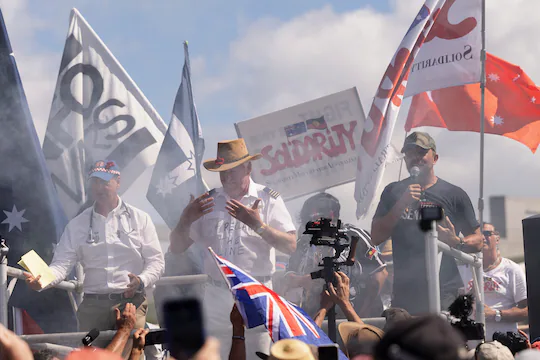SYDNEY — Lawmakers expressed fear Tuesday that anti-vaccination protests in Australia’s capital, inspired by the trucker-led demonstrations in Canada, could escalate.
The protests in Canberra, which have been energized by the self-described “Freedom Convoy” causing havoc in Ottawa but feature few trucks, have lasted for eight days and are set to continue until at least the weekend amid concerns that the mostly peaceful atmosphere could deteriorate.
As protesters waved signs saying “GENOCIDE” and “FREEDOM” in front of Parliament, lawmaker Kristina Keneally warned that the crowd contained “individuals that our national security agencies are worried about.”
“Some of these protesters actually want to undermine and overturn democracy,” Keneally, an American-born senator for the Australian Labor Party, told reporters. She cited the arrest of a protest organizer last week after police allegedly found a gun in his car.
Protest organizers and politicians who support the demonstrations rejected her claim. And a few hours later, another lawmaker welcomed eight demonstrators into the capitol so they could deliver a list of demands.
“I thought these people deserved the chance to get their demands delivered directly to the prime minister and opposition leader, so I was more than happy to facilitate that,” said Craig Kelly, who leads the far-right United Australia Party in Australia’s House of Representatives.
The Canadian convoy has inspired similar protests around the world, including in New Zealand, where the capital, Wellington, was also the site of noisy demonstrations on Tuesday, and Europe, where truckers are planning to descend on Brussels.
The possibility of further unrest is real in Australia, where several anti-vaccine protests in Melbourne turned violent last year. Australian Federal Police expelled protesters from one Canberra location last week and have said they soon will need to clear another one if demonstrators don’t leave. During a related protest in late December, demonstrators set fire to Australia’s Old Parliament House, causing serious damage and leading to several arrests.
Police estimated Tuesday’s crowd at 1,000 people. Protesters said their ranks were far higher. So far, the demonstrations have remained mostly peaceful, according to Kaz Ross, an independent researcher into far-right extremism and conspiracy theories who has been closely following the self-described “Convoy to Canberra.”
The demonstrations have drawn followers of disparate ideologies, she said; but the one that has dominated is Australia’s “sovereign citizen” movement. According to the international conspiracy theory, governments have been co-opted by illegal corporations, so “sovereign citizens” or “freemen” should ignore their laws, oust the politicians and restore people’s republics.
Australia to reopen to vaccinated tourists, two years after it closed international borders
The Canberra protests have drawn energy from the demonstrations in Canada, but Australia’s anti-vaccine and sovereign citizen movements have been building for months under the pandemic, she said. Some of the early organizers were truck drivers, but few Australian truckers own their own vehicle, meaning the broad and leafy streets of Canberra were unlikely to be clogged with 18-wheelers anytime soon.
The Canberra protest quickly developed a communal feel, as people whose anti-vaccine attitudes have made them pariahs in one of the most highly vaccinated countries in the world suddenly found themselves among people who shared their beliefs, Ross said. Protesters organized meals, camping gear, even massages.
“They are setting up for an occupation, whereas the Ottawa thing is a blockade,” she said, comparing the Canberra protest to the Occupy Wall Street movement that took over some American parks in 2011. “They are building something they see as sustainable, and they see themselves as there for the long haul.”
Ross said she expected the number of protesters to spike this weekend and that there is potential for violence in the coming weeks when they realize their list of demands is not going to be met.
“All these things are coming to a boiling point,” she said.
On Monday, one protest organizer ended a video with an allusion to hanging the prime minister, while in another clip, a protester warned a far-right lawmaker to stay away from Parliament, adding that if he had his way he would call in “bombers” to wipe it out.
In an interview later, the lawmaker, Sen. Malcolm Roberts from the One Nation Party, said the protests had been peaceful and respectful, aside from a small group.
“They were trying to hijack [things], and they had no, no success whatever. They were set aside,” he said. “I don’t see the very violent in the crowd that I addressed yesterday.”
Some of the lawmakers supportive of the protests, however, worry that the situation could deteriorate.
“The longer things go on, the more they can go astray,” said Sen. Gerard Rennick, a member of the ruling conservative coalition who has fallen out with Prime Minister Scott Morrison over vaccine mandates. “But hopefully they will get their message across this week and many people will have to return [home].”
The capital’s top elected official, Andrew Barr, said the protesters were unlike other demonstrators who often come to Canberra.
“The right to protest doesn’t extend to stalking our city, harassing business owners and residents and aggressively flouting the law,” he said Monday. “This is one of the most vaccinated cities on Earth, so the anti-vaccine message from many protesters could not have a less receptive audience.”


